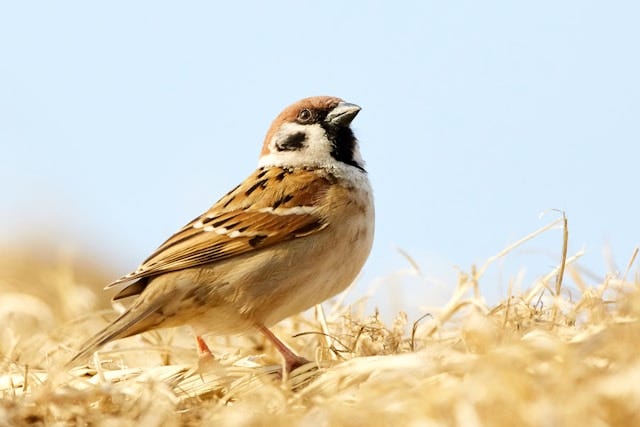How a little bird taught me to love and let go
A story of unconditional love, loss, grief, and quiet acceptance.
I used to think that grief was only for those who face death, having something precious ripped from their hands with finality. I hadn’t learned that it can happen so gradually, even with the living, creeping in with slight changes or shifts of needs and perspectives, that you don’t sense the loss until it’s gone, staring at your empty hands.
We rescued a burung pipit once—a Eurasian tree sparrow, ubiquitous in Malaysia, especially in our small town, where daily rain kept the surrounding mountains lush.

You’ll find them chirping in chorus among trees, perching on parked cars, skipping through blades of cow grasses, teetering on electrical wires, and pecking at leftover rice and noodles on hawker centre tables. Usually, you’ll hear the frantic flap of their wings as they dart away before you can get a good look at them, a speck of brown blurring into the distance.
This particular sparrow, however, did not fall from a tree. It fell from a nest that its mother, against nature, built at a narrow slit below the zinc roof of our porch, sprawled on the cold tiles, still raw-looking like all newborns do, pink with translucent skin, clearly not of this world. Not yet. Our eternal tropical heat hung around, clinging to our damp skin.
My sister was the one who found it and alerted me with a loud, frantic call. When I first laid my eyes on it, my maternal instinct kicked in—if you can call it that for a girl just entering puberty. I resolved to rescue this bird at all costs.
I briefly considered if we could sneak it back into the nest above, a tangle of sticks and straws poking out from under the roof. I heard once that when a fallen bird is returned to its nest, the mother won’t embrace it—the taint of foreign scent marking it as an other. It might have been a myth, but at that time, I was so sure of it that I knew I had to become its mother.
I took her into our verandah, a tiled space extending from our living room through the sliding door into the porch, enclosed by a tall metal grill from floor to ceiling, meant to keep danger out, though it always felt more like it was keeping us in. I hesitated to lay her fragile naked body on the shoe rack at the end of the wall.
Then, the idea came to me—I would make her a little house out of paper. My Ah Ma had taught me how to fold an origami open box, which she used at the table for food scraps like prawn shells and peanut husks. It was her clever way to wash less and clean up more easily.1
After deftly folding one, I laid my new baby in the cozy makeshift home. I fed her some water with a teaspoon, and it seemed to work. But she kept squeaking, head cocked and beak wide open. I’d seen that gesture before—on documentaries, when chicks begged for food from their mother, usually worms. But I'm not going to get some worms, I'm too domesticated for that.
I rummaged through the kitchen and settled on an oat biscuit, smashing it into soft, sticky clumps. Using a toothpick like a mother bird’s beak, I fed her.
It worked! The baby bird ate some and seemed very contented. I was so proud of myself.
I named her Tweety, after the yellow bird in a cartoon of its namesake. I’d long told people that it was my favorite cartoon character, though I’m not sure I ever liked it that much. But once claimed, I held onto it stubbornly. So the baby sparrow became Tweety.
Tweety grew steadily as days went by. She began climbing out of her paper house and hopped around the table. As days turned to weeks, she expanded her range to our sofa and the armchairs, claiming the living room one launch at a time. Much to my mother’s horror, Tweety left droppings everywhere. So, I covered the sofa and armchairs with newspapers.
I watched her with pride and fascination as she grew stronger each day, unfolding into a grown bird.
By then, my father got tired of shuffling newspapers to find a spot on the sofa, rather than reading them in peace. He came back with a metal cage, the size of a large tissue box. I never knew where he got it from—clearly custom-made by hand, no doubt recently, with twisted wires.
He grabbed Tweety and tried to shove her through the opening at the top, and poor Tweety, I've never seen her in such a grave panic, flapping her wings frantically as if she were drowning. I leapt up, screaming, and put a stop to my father’s attempt. The cage was promptly taken away and was never to be seen again.
And so, Tweety continued her escapades around the living room unabated. I continued as a proud mama— fed her with my toothpick beak, filled the dish with water, and refreshed the newspapers daily.
One day, as I was sitting there half reading, half watching Tweety hop-fly around, I sensed a shift in her. She was standing on the coffee table, back straight and looking out of our sliding door into the verandah and beyond. I looked in that direction and saw another Eurasian sparrow perched on our verandah grill. My eyes darted back to Tweety, who, at that moment, chirped and zipped off with the sparrow, the air still humming with the beat of her wings.
And with that, Tweety was gone. Without a goodbye. Without a backward glance.
I sat there for a while, stunned at first, and grieved the next. For a foolish instant, I believed that Tweety would return after a short outing, but I knew there was no way she could find her way back.
Would she even remember me?
I then consoled myself that she had found her companion and would now live a happy and fulfilling birdy life. And that it was for the best. A living room is not a life for a bird.
But would she know how to survive in the wild? In my foolish young love, I had not thought to teach her the true bird ways. How would she find food? Would she even eat worms? How would she find shelter? I can only hope her newfound friend, or maybe even a community, would aid her.
Maybe this is how we all deal with love and loss. Maybe this is how we grieve.
We gave all when we could, nourishing and nurturing our love when they needed us, but also ensuring their freedom at all costs. And someday, when the time has passed, our loved one may move on or may have changed.
Grief may keep us clinging to the hope they’ll return to as they were, but at some point, acceptance arrives. That part of life has passed, and now a new one begins.
It helps to stay positive and trust that it’s for the better. And when doubts creep in about whether we did enough with the time we had, there’s comfort in knowing we gave our best.
In time, we move on to something new, something different. That's the natural course of things.
Many months later, I was once again sitting on the armchair, reading on a typical hot, humid day. The birds chirped in choruses, the wind rustled the leaves, and the sunlight trickled in through our half-opened sliding door, casting a kaleidoscope of shadows on the cool marble floor.
A sudden flutter broke the air, loud and purposeful. My heart skipped a beat as I looked up. Tweety perched on the verandah grill, almost at the exact spot where her companion was.
The moment stood still—the sounds dimmed, the light intensified, and the bars of the grill faded into the background.
She looked me in the eyes, as if to tell me something. But before I could respond, she fluttered away. Again.
I smiled and said in my heart, “You're welcome.”
If the story has moved you and resonated with you, please consider sharing it with someone who might need it today.
You may also like:
Now that I think about it, I should start this tradition again at home, more for nostalgia than need, since we have a dishwasher and we don't eat that much meat and seafood at home that it warrants the need.





This was such a cute story, and an important lesson about grief. Also, cool to hear your voice!
A beautiful story. Thank you for sharing it with us.